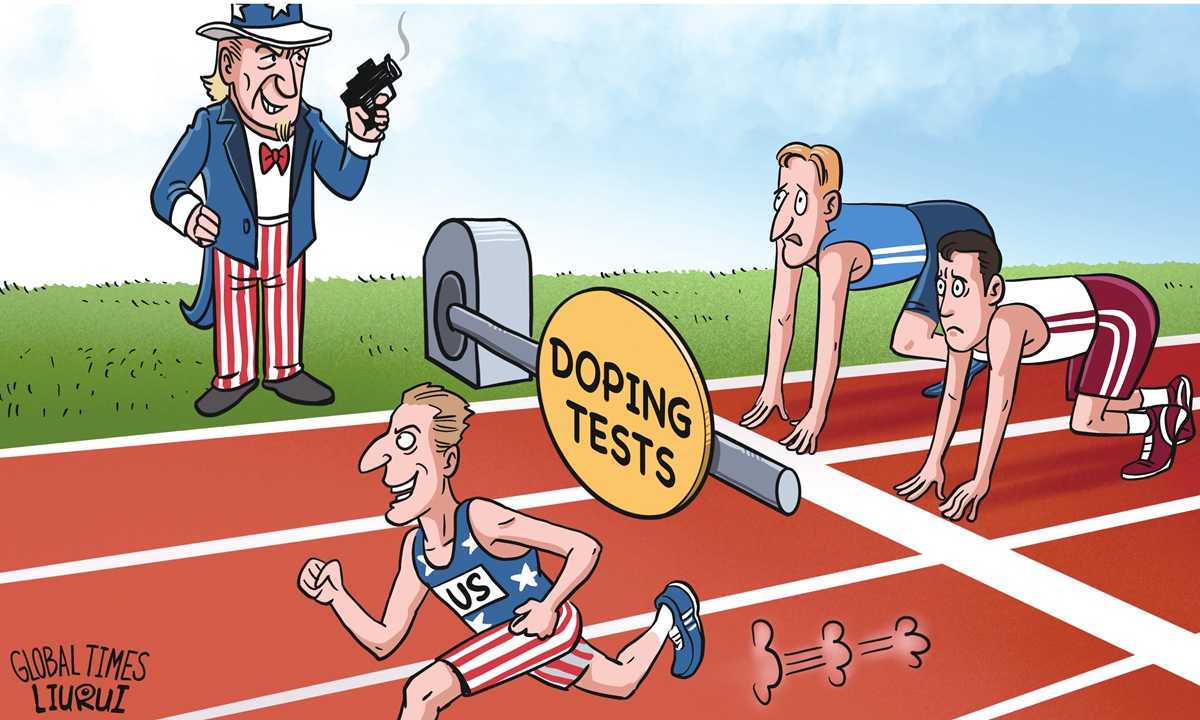While the US has ramped up efforts to discredit Chinese athletes with doping allegations, a media investigation report revealed on Saturday that a deeply entrenched doping industry has taken root in the US over recent decades, from athletes to coaches and agents, and from pharmaceutical companies to government bodies.
With the US indulging doping practices meanwhile struggling with domestic drug abuse, Chinese experts said Washington is throwing mud at others with its “polluted culture,” warning that global sport industry should remain vigilant against its ill intentions particularly in the next Olympics to be held on its soil.
The revelation by Yuyuantantian, a media arm of China Media Group, comes from a comprehensive review of US doping scandals in the past 20 years.
From the outset, most US professional leagues and the National Collegiate Athletic Association have not signed the World Anti-Doping Code, leaving them beyond its control and creating a foundation for internal doping cover-up in the country. And thus from a young age, American athletes are exposed to the allure of doping, often encouraged by their coaches, agents, and sports institutions, Yuyuantantian said in the report.
Coaches play a crucial role in this area, particularly in youth swimming teams, where they have been known to secretly administer painkillers and other prescription drugs under the guise of treating injuries. Many of these drugs are banned by WADA, alongside performance-enhancing steroids, the investigation report said.
An earlier study by the AP found that among 61,000 US college athletes, thousands exhibited unnatural weight gain — an indication of steroid use, the report noted. “The widespread doping practices are sustained by collusion between coaches and pharmaceutical companies, forming a critical link in the doping ecosystem,” it said.
By the time American athletes reach the international stage, many are already addicted, the investigation has noted. The report cited American cyclist Lance Armstrong, a seven-time Tour de France champion, as a prime example.
He admitted that doping helped him for each of his seven Tour de France wins, by using EPO, human growth hormone, and diuretics. He also admitted to falsifying documents saying he passed drug tests, according to media reports.
The Yuyuantantian report disclosed that his team manager and doctor were complicit in the scheme, and team doctors fabricated his illnesses to justify the “legal” use of drugs.
The US government is the most influential manipulator behind the scenes, the investigation report said.
On the global stage, it leveraged its power to protect US athletes, often ensuring they avoid testing to gain an unfair advantage. In addition, the US Olympic Committee frequently “overlooks” such actions, leading to widespread abuse of substances like testosterone, it revealed.
According to media reports, US athletes applied for Therapeutic Use Exemptions (TUEs) at a rate more than ten times that of other countries.
As international anti-doping efforts expanded, countries established independent agencies outside the IOC. In response, the US government enacted legislation granting its anti-doping agencies "long-arm jurisdiction," enabling them to investigate and harass athletes from other nations – in this case, the Chinese swimmers, the report said.
“This stems from an arrogant sense of exceptionalism of the US, which regards itself unique and superior to others. Thus, it tries to disrupt international norms by imposing its domestic rules on the global stage, not only in sports but in almost all arenas,” Li Haidong, a professor from the China Foreign Affairs University, told the Global Times on Saturday.
Industry insiders have revealed that in the lead-up to the Paris Olympic Games, the US deliberately sought to stir up controversy around Chinese doping allegation by rehashing unsubstantiated reports from three years ago. This move is intended to disrupt Chinese team’s preparations for the Paris Games and even attempt to disqualify Chinese athletes.
The International Testing Agency (ITA) confirmed on Friday that related reports from the US have led to the excessive anti-doping tests on the Chinese Olympic swimming team.
The smearing of Chinese athletes is also a result of jealousy, as the US cannot bear to see their traditionally-dominant sports like swimming being surpassed by China, observers noted. This approach again mirrors the zero-sum logic that characterizes US policy in other areas.
What’s more, Li noted that as the US struggles with widespread issues like marijuana, doping, and prescription drug abuse, it is exporting this same “polluted culture” to the global stage. “This is an attempt to throw mud at the whole world,” Li said.
Sports also are, in the mind-set of US politicians, a geopolitical tool to undermine its rivals’ soft power, the expert added, warning that the world should be vigilant against the weaponization of sports in the Paris Games as well as the Los Angeles Olympics in 2028.
International Olympic Committee (IOC) president Thomas Bach on Friday called on the US Anti-Doping Agency (USADA) to respect the supreme authority of the World Anti-Doping Agency (WADA), while emphasized the IOC's full confidence in WADA.
Bach made the remarks during a press conference while responding to a controversy that stems from allegations by WADA that USADA allowed athletes who violated anti-doping rules to continue competing without sanctions. In exchange for their cooperation in providing information on other doping violations, these athletes were reportedly shielded from public exposure and penalties.
WADA recently came under US attack, as the agency confirmed China was blameless after US media hyped a 2021 incident in which 23 Chinese swimmers tested positive for trimetazidine (TMZ) due to inadvertent contamination.
International pressure mounts on US over its anti-doping practices
After smearing Chinese athletes in recent months over so-called doping problems, the US is now facing mounting pressure over its ...
Related posts:












